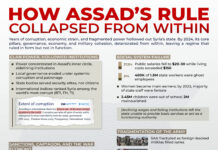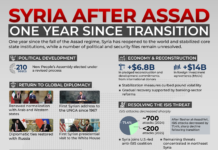
Assad and SSNP: Embracing Fascist Alliances
Syrian politics has long been entwined with the existence of a group known as the Syrian Social Nationalist Party (SSNP), which bears striking similarities to the Nazi Party of Germany. Founded by Antoun Saadeh in 1935, just two years after Adolf Hitler came to power, the SSNP proclaimed that “Syria is for the Syrians and the Syrians are one nation.” Despite outlasting the Nazi regime, the SSNP’s controversial history and its collaboration with both Assad regimes, current leader Bashar Assad and before him his father Hafez Assad, have raised concerns about the unholy alliance between dictatorship and radical-fascist ideologies, hindering the pursuit of freedom and social justice in the region.
The Birth of an Ideology
Originally established in 1932 in Beirut as a nationalist secular party advocating for a strong Pan-Syrian identity, the SSNP sought to create a “Greater Syrian” state. The American magazine The Atlantic published an article highlighting the party’s controversial use of symbols, including a salute reminiscent of the Nazi regime and the adoption of a symbol known as the red hurricane, which bears resemblance to a swastika in motion. Passionate and devoted to their cause, the SSNP embraced a belief in armed struggle, exemplified by their slogan, “bullets over ballots.”

After operating underground for several years, the party emerged publicly in 1935. In 1949, Saadeh led a failed revolution against the Lebanese state, resulting in his execution for treason. In a vengeful act, the SSNP assassinated former Lebanese Prime Minister Riad al-Solh. In the 1950s, the party turned ultra-nationalistic in Syria and was responsible for the assassination of Adnan al-Maliki, the Syrian Army’s Deputy Chief of Staff. It faced severe suppression from the Baathists and Communists in response.
In Lebanon, however, the SSNP transformed its role from an enemy of the state to a defender during a revolt against Lebanese President Camille Chamoun. It sided with the government until the conflict’s resolution but staged another failed coup in 1961. By the 1970s and 1980s, the SSNP had established military squads that formed alliances with various groups, including sectarian militants such as Hezbollah. Throughout its existence, the party has engaged in numerous violent acts, including coups, terrorist operations, and assassinations. Reports even suggest the SSNP’s involvement in suicide bombings, as noted by the Washington Institute.
The SSNP and Baathists Collaboration
The alignment of the SSNP and the Arab Socialist Baath Party traces back to the Syrian occupation of Lebanon and the Lebanese civil war in 1976. Seeking to annex Lebanon, the SSNP acted as a proxy for Syria. After Hafez al-Assad’s death in 2000, his son Bashar assumed power, leading to an improvement in relations between the SSNP and the state. In 2005, the SSNP was officially legalized, marking a remarkable turnaround in political relations. It even secured two parliamentary seats.

As the Syrian revolution unfolded, the SSNP saw an opportunity to rise to prominence. Initially, the party participated in counter-demonstrations in support of the Assad regime. As the conflict escalated into a civil war, the SSNP received arms and training from the regime, solidifying its status as a distinct ally. The party believed that the revolution aimed to divide Syria along non-social nationalistic lines based on religion or ethnicity. Interestingly, these are the same accusations leveled against the regime, particularly with regard to deliberate demographic changes that disproportionately affect the Sunni population. However, by 2016, the SSNP claimed to have amassed approximately 6,000-8,000 fighters, expanding its ranks throughout the conflict due to its fearsome reputation.

According to a 2019 report by the Clingendael Institute, an SSNP official stated that “there are no major differences” between the SSNP and the Ba’athists anymore, attributing the convergence of their views to the war and its course of events. To assess the political influence of the SSNP within Syria, political analyst Trenton Schoenborn emphasizes that “the SSNP generally expands its influence through public outreach and programming.” He acknowledges that the war has allowed the SSNP to grow and gain more freedom of action, as the government lacks the resources to police every militia. Schoenborn further states, that Damascus’s ability “to maintain control over them has definitely weakened over the years,” granting the group more autonomy in recruitment and the selection of officers for militias like the “Eagles of the Whirlwind,” which is aligned with the Syrian government, and other elite groups linked to the SSNP.
Damascus’s Pragmatic Alliances
Given the Assad regime’s proclivity for survival through alliances and its willingness to serve foreign interests, such as Russia and Iran, in order to retain power, it is unsurprising that the regime has forged a partnership with the SSNP. Although the party is essentially a radical fringe group, the Syrian government has strengthened its place within its administration by installing Ali Haidar, the SSNP’s Syrian head, as the Syrian Minister of State for National Reconciliation Affairs.
Nevertheless, despite affording them opportunities to grow, the regime has ensured that the SSNP’s leadership is integrated into the Baath Party’s National Progressive Front (NPF), effectively bringing the SSNP under control. Furthermore, with only a few seats in parliament, the SSNP’s political influence is minimal, likely kept marginalized by the regime to avoid competition.

In essence, Schoenborn states the regime’s lack of concern with ideals, regarding who it allies with or steps on, and claims that it’s all about “survival of the patron, regardless of the outcome for the client.” He mentions the regime’s treatment of the likes of Rami Makhlouf – Syria’s former richest man and Bashar al-Assad’s cousin, who had all of his assets seized. Assad has demonstrated a willingness to cooperate with extremist parties, whether it be Hezbollah or engaging in case-by-case coordination with ISIS on the front lines. Schoenborn concludes that Damascus will partner with anyone when times are tough, but will readily consume its allies to ensure its own survival and hold onto power.
The Consequences of an Unholy Alliance
The alignment between the Assad regime and the SSNP, driven by pragmatic considerations, plays a significant role in shaping Syria’s current bleak political landscape. Both entities uphold agendas and ideologies that prioritize the preservation of an authoritarian governance. History demonstrates that both fascists and the Assad clan have resorted to ruling with an iron fist and consolidating power, regardless of the cost in innocent lives.

Faced with an array of challenges, the regime understands the necessity of forging alliances to survive. In this context, the SSNP’s extensive network within intellectual, military, and business circles serves to bolster the regime’s grip on power and counter potential threats to its authority. However, the regime’s alliance and willingness to collaborate with extremist parties persistently oppresses millions of Syrians, highlighting its prioritization of self-preservation above all other considerations.








